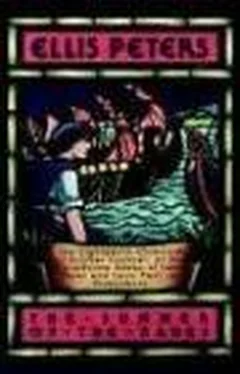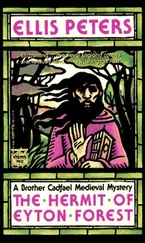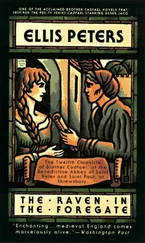“But headstrong!” Meirion lamented, his voice recovered and loud with anguish. “Who knows what risk she might not venture? And if she has fled me now, she will still hide from me. This I never foresaw, that she could feel so driven and so beset.”
“I say again,” said Owain firmly, “use my garrison, my stables, my men as you will, send out after news of her, for surely she cannot be far. As for the ways to westward, we will watch for her as we go. But go we must. You well know the need.”
Meirion drew himself back a little, erect at his tallest, and shook his broad shoulders.
“Go with God, my lord, you can do no other. My girl’s life is but one, and many depend upon you. She shall be my care. I dread I have not served her turn lately as well as I have served my own, or she would never have left me so.”
And he turned, with a hasty reverence, and strode away towards the hall, so precipitately that Cadfael could see him clambering fiercely into his boots and marching down to the stable to saddle his horse, and away to question everyone in the village outside the walls, in search of the dark daughter he had gone to some pains to despatch into distance, and now was all afire to recover. And after him, still silent, stonily expressionless, potentially disapproving, went Canon Morgant, a black recording angel.
They were more than a mile along the coastal track towards Bangor before Brother Mark broke his deep and thoughtful silence. They had parted from the prince’s force on leaving Aber, Owain bearing southwest to take the most direct road to Carnarvon, while Cadfael and Mark kept to the shore, with the shining, pallid plain of the shallows over Lavan Sands reflecting the morning light on their right hand, and the peaks of Fryri soaring one above another on their left, beyond the narrow green lowlands of the coast. Over the deep channel beyond the sands, the shores of Anglesey were bright in sunlight.
“Did he know,” Mark wondered aloud suddenly, “that the man was dead?”
“He? Meirion? Who can tell? He was there among the rest of us when the groom cried out that a horse was missing, and Bledri was held to have taken him and made off to his master. So much he knew. He was not with us when we looked for and found the man dead, nor present in the prince’s counsel. If the pair of them were safe in their beds they cannot have heard the news until this morning. Does it signify? Dead or fled, the man was out of Meirion’s way, and could scandalise Morgant no longer. Small wonder he took it so calmly.”
“That is not what I meant,” said Mark. “Did he know of his own knowledge? Before ever another soul knew it?” And as Cadfael was silent, he pursued hesitantly: “You had not considered it?”
“It had crossed my mind,” Cadfael admitted. “You think him capable of killing?”
“Not in cool blood, not by stealth. But his blood is not cool, but all too readily heated. There are some who bluster and bellow, and rid their bile that way. Not he! He contains it, and it boils within him. It is likelier far to burst forth in action than in noise. Yes, I think him capable of killing. And if he did confront Bledri ap Rhys, he would meet only with provocation and disdain there. Enough to make for a violent end.”
“And could he go from that ending straight to his bed, in such unnerving company, and keep his countenance? Even sleep?”
“Who says that he slept? He had only to be still and quiet. There was nothing to keep Canon Morgant wakeful.”
“I return you another question,” said Cadfael. “Would Cuhelyn lie? He was not ashamed of his purpose. Why, then, should he lie about it when it came to light?”
“The prince believes him,” said Mark, thoughtfully frowning.
“And you?”
“Any man may lie, not even for very grave reason. Even Cuhelyn may. But I do not think he would lie to Owain. Or to Hywel. He has given his second fealty, as absolute as the first. But there is another question to be asked concerning Cuhelyn. No, there are two. Had he told anyone what he knew about Bledri ap Rhys? And if he would not lie to Hywel, who had salved him and brought him to an honourable service, would he lie for him? For if he did tell anyone that he recognised Bledri as one among his prince’s murderers, it would be Hywel. Who had no better reason to love the perpetrators of that ambush than had Cuhelyn himself.”
“Or any man who went with Hywel to drive Cadwaladr out of Ceredigion for Anarawd’s sake,” agreed Cadfael resignedly, “or any who took bitter offence at hearing Bledri so insolent on Cadwaladr’s behalf in hall that night, spitting his threats into Owain’s face. True, a man is dead who was well-hated, living, and took no keep to be anything better than hated. In a crowded court where his very presence was an affront, is it any wonder if he came by a short ending? But the prince will not let it rest.”
“And we can do nothing,” said Mark, and sighed. “We cannot even look for the girl until I have discharged my errand.”
“We can ask,” said Cadfael.
And ask they did, at every hamlet and dwelling along the way, whether a young woman had not ridden past by this road, a dark Welsh girl on a young roan, all of one colour. A horse from the prince’s stables would not go unremarked, especially with a lone girl in the saddle. But the day wore on, and the sky clouded gently and cleared again, and they drew into Bangor by midafternoon; but no one could give them word of Heledd, Meirion’s daughter.
Bishop Meurig of Bangor received them as soon as they had threaded their way through the streets of the town to his cathedral enclave, and announced themselves to his archdeacon. It seemed that here everything was to be done briskly and briefly, with small respect to the planned and public ceremony Bishop Gilbert had preferred. For here they were by many miles nearer to the threat of Danish raiders, and very sensibly taking such precautions as were possible to cope with them if they should penetrate so far. Moreover, Meurig was native Welsh, at home here, and had no need of the cautious dispositions Gilbert felt necessary to secure his position. It might be true that he had proved at first a disappointment to his prince, by succumbing to Norman pressure and submitting to Canterbury, but stoutly Welsh he remained, and his resistance, if diverted, must still be proceeding by more subtle ways. At least he did not seem to Cadfael, when they were admitted to his presence in private, the kind of man to compromise his Welshness and his adherence to the ways of the Celtic Church without a long and doughty rearguard action.
The bishop was not at all like his fellow of Saint Asaph. Instead of the tall, dignified Gilbert, selfconsciously patrician and austere without, and uneasily insecure within, here was a small, round, bustling cleric in his forties, voluble of speech but very much to the point, rapid of movement and a little dishevelled and shaggy, with a sharp eye and a cheerfully bouncing manner, like a boisterous but businesslike hound on a scent. His pleasure in the very fact of their coming on such an errand was made very plain, and outweighed even his delight in the breviary Mark had brought him, though clearly he had an eye for a handsome script, and turned the leaves with lovingly delicate movements of thick, strong fingers.
“You will have heard already, Brothers, of the threat to our shores, so you will understand that here we are looking to our defences. God grant the Norsemen never get ashore, or no further than the shore, but if they should, we have a town to keep, and churchmen must turn to like the rest. For that reason we observe at present little state or ceremony, but I trust you will be my guests for a day or two before you need return with my letters and compliments to your bishop.”
Читать дальше












